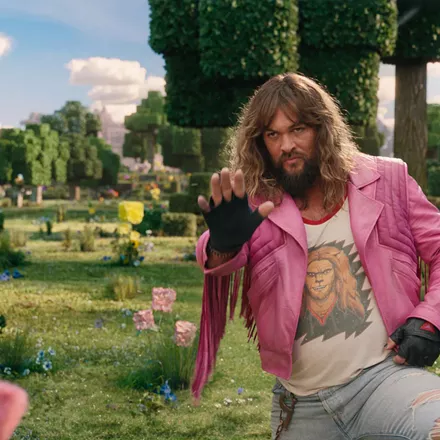
Journey back with me, friends, to the early 1990s. The internet was barely a twinkle in Al Gore's eye, Russia was (for a moment, anyway) not the most dangerous threat to democracy and, at the movies, it was the era of the "from hell" psychological thriller. The latter involved tales of obsessive, disturbed characters and the terrified objects of those obsessions, piggybacking off the pop-culture phenomenon that was Fatal Attraction. Thus in the space of just a few years we had Single White Female (roommate from hell), The Hand That Rocks the Cradle (nanny from hell), Unlawful Entry (cop from hell), Pacific Heights (tenant from hell), The Crush (scorned teenager from hell) and more, all built around some free-floating anxiety that you never know when someone in close proximity to you is 100 pounds of crazy in a 50-pound bag.
Greta feels cut from almost an identical cloth, while providing a sense of why even the most formulaic of those '90s genre entries could work on a rudimentary level. Our connected characters are two lonely, emotionally isolated New Yorkers: Frances McCullen (Chloë Grace Moretz), a recent transplant still mourning the death of her mother the previous year; and Greta Hideg (Isabelle Huppert), a widowed pianist. They meet when Greta leaves her purse on a subway car and Frances decides to return it to her, leading to a friendship they both seem to welcome—until Frances has reason to believe that Greta is more calculating, and off-kilter, than she initially suspected.
One of the fundamental dynamics of the "from hell" thriller was the slow burn of the antagonist's emotional breakdown, leading our protagonist—and those around him or her—to question whether the protagonist's fears for their safety were actually warranted. Greta plays a different game, and not a particularly successful one, by having Greta herself go off the rails too soon, and too obviously, for anyone to doubt that there's something bad going down. It's a standard bit of the "from hell" playbook for Frances to look out the window of the restaurant where she works and spot Greta staring holes into her from across the street; it's a bit more confusing to have her still standing there when the police show up, apparently for the express purpose of making the police look callous and jaded.
That early turn by Greta from needy to nightmarish allows Huppert to go full bonkers, and she turns in some entertaining moments when she goes gleefully over the top. Yet even then, director Neil Jordan doesn't seem willing to fully take advantage of that whacked-out performance. There's a potentially terrific scene when Greta—by now clearly homicidal—begins dancing mad pirouettes to the Chopin record she has put on. But instead of allowing that moment its full twisted glory, Jordan shoots it from the blurry POV of someone who has been drugged and is falling unconscious. Jordan has crafted many stylish spins on horror concepts over the years—from The Company of Wolves to Interview with the Vampire to his most recent feature, 2012's Byzantium—yet this might have been a time when the right choice was to lean into not elegance, but mania.
Then there's the matter of the characters, where somehow Greta's script—credited to Jordan and Ray Wright—manages to be both too obvious and lacking in detail. The initial connection between the two women certainly makes emotional sense right off the bat, as Frances—motherless and also estranged from her father (Colm Feore) because he has already begun another relationship—seeks a surrogate mother, while Greta seeks a surrogate daughter. Yet too much about the origins of Greta's mental illness remains unexplored, and the icy reserve Huppert brings to a role isn't likely to generate a sense of sympathy. Without a backstory, Greta simply becomes a monster—and monsters aren't nearly as compelling as fucked-up but recognizably human people.
Jordan manages to wrestle more than a little filmmaking satisfaction from this story, including a tense sequence built around Greta texting Frances photos showing her stalking Frances' roommate (Maika Monroe). But Greta simply never manages to hit enough of the requisite psychological or visceral notes to make it feel like more than a disposable exploitation picture. Huppert's Greta might be the surrogate mom from hell, but the movie is barely from heck.





